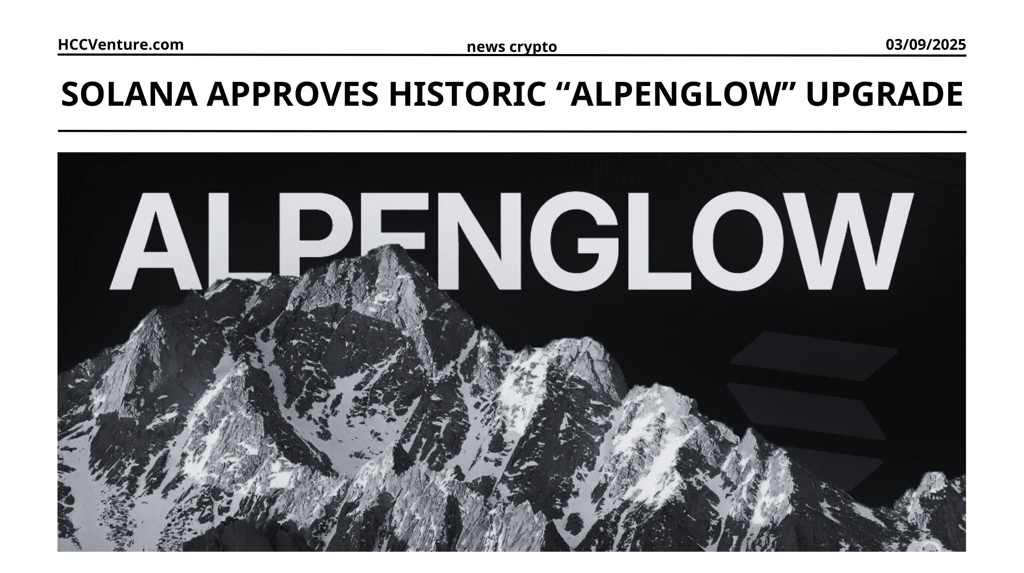Solana Approves Historic “Alpenglow” Blockchain Upgrade
The Solana blockchain ecosystem has reached a pivotal moment with the approval of the long-awaited “Alpenglow” upgrade, marking the most significant consensus change since its inception.
9/3/20252 min read


Solana with historic upgrade
The Alpenglow upgrade stems from Solana’s need to address persistent limitations in its current consensus mechanism, a combination of Proof-of-History (PoH) and Tower Byzantine Fault Tolerance (TowerBFT). PoH, a cryptographic timestamping system, has allowed Solana to achieve high throughput — recently reaching 35 million transactions per day — but its reliance on TowerBFT has introduced delays and vulnerabilities, notably the lack of formal safety guarantees against conflicting block confirmations.
The approval comes after a series of governance milestones, including the contentious SIMD-228 vote, reflecting a maturing community ready to embrace radical change. The timing coincides with Solana’s record-breaking performance, including a 107,540 transactions per second (TPS) stress test, and bullish market sentiment, with the SOL price trading at $211 after a 3% daily gain.
The motivation is multifaceted. Solana leadership, including co-founder Anatoly Yakovenko, sees Alpenglow as a response to competitive pressure from Ethereum scaling solutions and Solana’s own outages, which have historically undermined reliability. The upgrade’s promise of sub-second accuracy is aimed at high-frequency use cases—real-time finance, gaming, and payments—and is likely to attract institutional adoption. But the “turnaround” narrative is worth questioning: is it a genuine step forward, or a strategic move to regain market position in a crowded Layer-1 landscape that includes Ethereum’s Pectra upgrade and Solana’s parallel development of Firedancer?
Impact of the upgrade
Alpenglow introduces two core innovations: Votor, a direct voting protocol for block finality, and Rotor, an alternative data distribution system to Turbine. Votor leverages off-chain voting with cryptographic aggregation, achieving round one finality with 80% stake participation or round two finality with 60%, reducing latency to 150 milliseconds based on simulations.
The rotor optimizes data transmission, minimizing hops and improving bandwidth efficiency, a key factor in Solana's 65,000 TPS capacity. The "20+20" recovery model ensures the network continues to operate despite 20% of validators being hostile and 20% of validators being unresponsive, enhancing security.
Strategically, this puts Solana in a position to challenge Web2 benchmarks, such as Nasdaq’s 2,290 transactions per second, closing the gap from its current 400 TPS. This upgrade could double block space capacity and reduce processing times to 200 milliseconds, boosting DeFi revenue — which has now reached $562 million per quarter, outpacing Ethereum and Binance Smart Chain when standardized.
For developers, sub-second processing opens the door to real-time dApps that can compete with centralized systems. However, the transition from PoH — a key feature — raises compatibility concerns, and the off-chain voting transition could complicate the Jito auction mechanism, requiring tighter governance for Rotor integration.
Evaluation and Conclusion
Solana’s approval of the Alpenglow upgrade on September 2, 2025, with 98.27% community support, marks a major transformational milestone that will bring the network to Web2-level performance. Driven by the need to address consensus constraints and fueled by a bull market, the upgrade’s sub-second finality and improved throughput promise to reshape Solana’s role in DeFi, gaming, and payments. Anza’s strategic support and community consensus further underscore its potential to strengthen Solana’s competitive advantage.
Disclaimer: The information presented in this article is the author's personal opinion on the cryptocurrency field. It is not intended to be financial or investment advice. Any investment decision should be based on careful consideration of your personal portfolio and risk tolerance. The views expressed in the article do not represent the official position of the platform. We recommend that readers conduct their own research and consult with a professional before making any investment decisions.
Explore HCCVenture group
HCCVenture © 2023. All rights reserved.


Connect with us
Popular content
Contact to us
E-mail : sp_contact@hccventure.com
Register : https://linktr.ee/holdcoincventure
Disclaimer: The information on this website is for informational purposes only and should not be considered investment advice. We are not responsible for any risks or losses arising from investment decisions based on the content here.


TERMS AND CONDITIONS • CUSTOMER PROTECTION POLICY
ANALYTICAL AND NEWS CONTENT IS COMPILED AND PROVIDED BY EXPERTS IN THE FIELD OF DIGITAL FINANCE AND BLOCKCHAIN BELONGING TO HCCVENTURE ORGANIZATION, INCLUDING OWNERSHIP OF THE CONTENT.
RESPONSIBLE FOR MANAGING ALL CONTENT AND ANALYSIS: HCCVENTURE FOUNDER - TRUONG MINH HUY
Read warnings about scams and phishing emails — REPORT A PROBLEM WITH OUR SITE.
